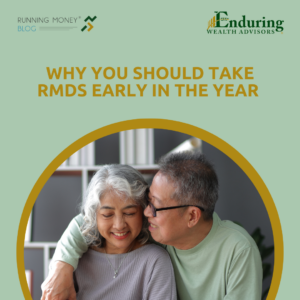 For those approaching or in retirement, managing Required Minimum Distributions (RMDs) is an essential part of your financial planning. Once you turn 73 (or 72 if your birthday was before January 1, 2023), the IRS requires you to withdraw a specific amount annually from your tax-deferred retirement accounts like IRAs and 401(k)s.
For those approaching or in retirement, managing Required Minimum Distributions (RMDs) is an essential part of your financial planning. Once you turn 73 (or 72 if your birthday was before January 1, 2023), the IRS requires you to withdraw a specific amount annually from your tax-deferred retirement accounts like IRAs and 401(k)s.
While you technically have until December 31 to take your RMD, there are compelling reasons to consider taking it earlier in the year. Let’s explore why timing matters and how it can benefit your financial strategy.
Tax Planning Advantages
If you withdraw your RMD early in the year, you gain clarity about your taxable income for that year. By knowing your withdrawal amount ahead of time, you can align other financial strategies, such as Roth conversions and charitable donations, more accurately. Drawing RMDs early in the year also allows more time to prepare for quarterly tax payments.
Protection Against Market Volatility
The stock market can be unpredictable, and waiting until year-end to withdraw your RMDs could expose your retirement funds to sudden downturns. By taking your distribution early in the year, you can mitigate the risk of being forced to sell investments at a lower value if the market declines later.
Increased Flexibility for Charitable Giving
For retirees who plan to make Qualified Charitable Distributions (QCDs), taking RMDs early can provide more time to execute charitable giving strategies. By directing distributions to eligible charities sooner, you can fulfill your giving goals and potentially reduce taxable income.
Building Flexibility into Your Cash Flow
Taking RMDs early in the year improves your cash flow management because it provides liquid assets for yearly expenses. Taking distributions early provides ready access to funds when you face home repairs, travel needs, or medical expenses, so you don’t need to access other accounts for unexpected costs.
If you don’t need your RMDs for immediate expenses, withdrawing them earlier also gives you the flexibility to reinvest the funds in a taxable account. This strategy allows for potential growth while ensuring you meet the required withdrawal rule.
Preventing Burdens for Your Beneficiaries
If you pass away unexpectedly without having taken your RMD, your beneficiaries will be responsible for handling the distribution. This could create additional stress during an already difficult time, as they will have to navigate complex financial requirements while grieving.
Additionally, the RMD could increase their taxable income for the year, potentially leading to a higher tax burden. If you pass late in the year, there may be limited time to set up an inherited IRA and process the RMD, which could result in complications and possible IRS penalties.
Creating Confidence
The retirement period ought to be dedicated to living life fully without the burden of financial deadlines. By withdrawing your RMD earlier in the year, you remove the pressure of meeting the December 31 deadline. Taking your RMD early removes one task from your list so you can concentrate on your goals and priorities.
What to Consider Before Acting
While early RMDs offer many advantages, it’s essential to consider your financial situation before making a decision:
- Tax Impact: Large withdrawals early in the year could push you into a higher tax bracket. Work with a tax professional to evaluate the impact on your overall tax liability.
- Spending Needs: Make sure taking your RMD early aligns with your cash flow needs and long-term financial goals.
Talk to your financial professional to see when it makes sense to take your RMD.
Important Disclosures:
The opinions voiced in this material are for general information only and are not intended to provide specific advice or recommendations for any individual.
All information is believed to be from reliable sources; however, LPL Financial makes no representation as to its completeness or accuracy.
This article was prepared by WriterAccess.
LPL Tracking #698811
Sources:
https://www.irs.gov/retirement-plans/retirement-plan-and-ira-required-minimum-distributions-faqs
https://www.irs.gov/newsroom/irs-reminds-those-aged-73-and-older-to-make-required-withdrawals-from-iras-and-retirement-plans-by-dec-31-notes-changes-in-the-law-for-2023
